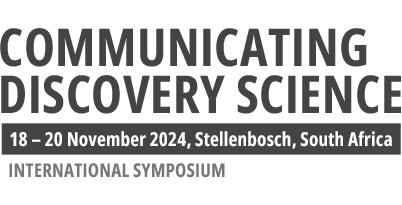Programme Day 3: 20 November 2024
WEDNESDAY 20 NOVEMBER 2024, DAY 3 – morning session
PLENARY 6: SOCIAL SCIENCE RESEARCH ABOUT COMMUNICATING DISCOVERY SCIENCE
Chair: Sara Yeo
Rapporteur: Linka Maritz
PRESENTATIONS
Communicating basic sciences in India: A landscape analysis
Banya Kar (National Institute of Immunology New Delhi, India)
Co-author: Sarah Iqbal (India)
In my talk, I will explore the What, Why, and How of public communication of basic sciences in India, drawing on insights from a nationwide survey of current practices among basic scientists at Indian research organisations and academic institutions. I will also share case studies of science communication initiatives in fundamental sciences. Through our SciCommINsights Initiative, my co-author Sarah Iqbal and I aim to identify challenges, opportunities, and best practices, offering recommendations to enhance science communication funding, policies, and programmes.
Mapping science communication in the Netherlands: Perception and practices amongst physicists
Sabine Heij (Leiden University, The Netherlands)
Co-authors: Julia Cramer (Leiden University), Margriet van der Heijden (Eindhoven University of Technology); Ivo van Vulpen (Leiden University), The Netherlands
Academics play a crucial role in instigating science communication, helping to make research accessible and impactful to a wider audience. But how do academics, particularly in physics, currently communicate about their work? In this talk, I will present findings from our study on science communication attitudes and practices of Dutch physicists. From the influence of tenure to the use of various communication formats, I will explore key insights into how physicists engage with the public. Finally, I will discuss the broader implications of our findings for science communication activities within physics and the academic community at large.
North American discovery scientists’ communication goals
John Besley (Michigan State University, USA)
Co-author: Anthony Dudo (University of Texas at Austin, USA)
All strategic communication builds from goals. We cannot help scientists communicate effectively if we do not know what they hope to achieve from their communication efforts. Similarly, conversations about communication ethics require honest discussions about what we are hoping to achieve from the time and energy we put into communicating. This presentation will share survey data (n = ~1,900) about the priority audiences and goals of North American-based basic scientists from several different fields. It will also suggest practical and conceptual paths forward focused on the importance of putting goal discussions at the centre of future science communication discussions.

